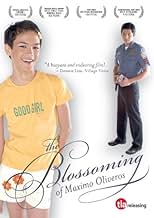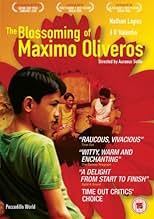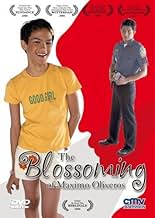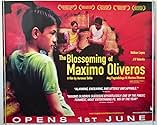O Desabrochar de Maximo Oliveros
Título original: Ang pagdadalaga ni Maximo Oliveros
AVALIAÇÃO DA IMDb
7,0/10
1,7 mil
SUA AVALIAÇÃO
Adicionar um enredo no seu idiomaA young boy falls in love with a handsome policeman who is investigating his family's criminal activities.A young boy falls in love with a handsome policeman who is investigating his family's criminal activities.A young boy falls in love with a handsome policeman who is investigating his family's criminal activities.
- Prêmios
- 24 vitórias e 28 indicações no total
JR Valentin
- Victor Perez
- (as J.R. Valentin)
Jett Desalesa
- Leslie - Maxi's friend
- (as Sir Jett Desalesa)
Avaliações em destaque
Though its a thoroughly Catholic-dominated country, the Philippines is said to have a more lax attitude towards "the gay" than other more liberal, democratic countries, like the one I live in. Many point to its cinema as evidence of this. Of course, this is from the outside looking in. LGBT folks, particularly the effeminate "bakla" male, might be commonplace in Philippine film, but the ones we don't see on screen face a particular type of oppression. They are often an object of ridicule, stereotyped as shallow, loud-talking and outrageously "mayabang," and usually sex-crazed. And a lot of folks, gay or straight, eat it up.
Despite its deceptive marketing (from the DVD cover/promo poster to the trailer), Auraeus Solito's Ang Pagdadalaga ni Maximo Oliveros/The Blossoming of Maximo Oliveros (2006) isn't at all about a flamboyantly gay boy's crush on the hunky neighborhood police officer that happens to be set in a third world barrio. The story is the barrio, and all its contradictions, initially dressed up as a neorealist comedy evoking both Lino Brocka and Bagets at once before taking a darker turn halfway through.
Like all good (worthwhile) Philippine stories, its aware of acute third world contradictions without overtly speaking on it. If Brillante Mendoza's work emphasizes people's idealism despite wretched conditions, Solito's flips the formula. His Philippines is one where the people are wretched but the settings, still unmistakably impoverished, can also be a magical, wonderfully pastel-colored place.
Maxi (Nathan Lopez) is 12-years old, gay, and plays surrogate mother to his family of petty thieves: tatay Paco (Soliman Cruz) and his older brothers Boy and Bog. The barrio is his playground, until one night he's assaulted by some knuckleheads. Policeman Victor (JR Valentin) comes to his rescue, and they become friends much to his family's objection. Matters complicate when Boy ends up killing somebody in a botched robbery attempt. Lopez brings remarkable ease to the title character, embodying urban poor Philippines with simplicity and struggle. His selfless need/want to care for others is carried by a fragile balance between a naive confidence of who he is and a growing insecurity of where he is (and where he's heading). He dreams in a bubble in the process of bursting, asking his father "Wala na bang ibang paraan itay?" (Is there no other way, dad?)
On the surface, he's nothing like his macho, gun-toting father. However, beneath the princess demeanor, he is his father's son, perhaps more so than his brothers. Conditions have forced Paco to consider what is more dignified: starving with a factory job, or getting by as a petty thief. Maxi has inherited his father's most lasting trait: a commitment to keep the family together. Or at least fed, clothed and sheltered, even if it means doing the "wrong" thing. Thus, Maxi's "blossoming" has less to do with dealing with his rejected affections for Victor and more with facing down the reality of his family's livelihood.
Restrained by necessity rather than stylistic choice, Solito shows us what could be done with a digital camera, $10,000US and 13 days of shooting. It's a style of film that can never be overdone in the Philippines, where lack of support from the media industry and government and resources forces an organic creativity.
Solito's execution is matched by writer Michiko Yamamoto's (Magnifico, 2003) gift for compact, delightful drama/comedy without teetering to far in either direction. Thanks to this collaboration, Ang Pagdadalaga ni Maximo Oliveros is a leap forward from the gay caricatures we've gotten too used to, and yet another piece of a compelling argument that Philippine cinema isn't all cornball and melodrama. Or, that a movie can still have those elements and not be shitty.
Despite its deceptive marketing (from the DVD cover/promo poster to the trailer), Auraeus Solito's Ang Pagdadalaga ni Maximo Oliveros/The Blossoming of Maximo Oliveros (2006) isn't at all about a flamboyantly gay boy's crush on the hunky neighborhood police officer that happens to be set in a third world barrio. The story is the barrio, and all its contradictions, initially dressed up as a neorealist comedy evoking both Lino Brocka and Bagets at once before taking a darker turn halfway through.
Like all good (worthwhile) Philippine stories, its aware of acute third world contradictions without overtly speaking on it. If Brillante Mendoza's work emphasizes people's idealism despite wretched conditions, Solito's flips the formula. His Philippines is one where the people are wretched but the settings, still unmistakably impoverished, can also be a magical, wonderfully pastel-colored place.
Maxi (Nathan Lopez) is 12-years old, gay, and plays surrogate mother to his family of petty thieves: tatay Paco (Soliman Cruz) and his older brothers Boy and Bog. The barrio is his playground, until one night he's assaulted by some knuckleheads. Policeman Victor (JR Valentin) comes to his rescue, and they become friends much to his family's objection. Matters complicate when Boy ends up killing somebody in a botched robbery attempt. Lopez brings remarkable ease to the title character, embodying urban poor Philippines with simplicity and struggle. His selfless need/want to care for others is carried by a fragile balance between a naive confidence of who he is and a growing insecurity of where he is (and where he's heading). He dreams in a bubble in the process of bursting, asking his father "Wala na bang ibang paraan itay?" (Is there no other way, dad?)
On the surface, he's nothing like his macho, gun-toting father. However, beneath the princess demeanor, he is his father's son, perhaps more so than his brothers. Conditions have forced Paco to consider what is more dignified: starving with a factory job, or getting by as a petty thief. Maxi has inherited his father's most lasting trait: a commitment to keep the family together. Or at least fed, clothed and sheltered, even if it means doing the "wrong" thing. Thus, Maxi's "blossoming" has less to do with dealing with his rejected affections for Victor and more with facing down the reality of his family's livelihood.
Restrained by necessity rather than stylistic choice, Solito shows us what could be done with a digital camera, $10,000US and 13 days of shooting. It's a style of film that can never be overdone in the Philippines, where lack of support from the media industry and government and resources forces an organic creativity.
Solito's execution is matched by writer Michiko Yamamoto's (Magnifico, 2003) gift for compact, delightful drama/comedy without teetering to far in either direction. Thanks to this collaboration, Ang Pagdadalaga ni Maximo Oliveros is a leap forward from the gay caricatures we've gotten too used to, and yet another piece of a compelling argument that Philippine cinema isn't all cornball and melodrama. Or, that a movie can still have those elements and not be shitty.
Regardless the controversial topic and my non-knowledge of the reality of those events (for example, volume of corruption within police and acceptance of gays in the Phillippines), as for a film as such, it was skilfully accomplished: good/great performances by major actors, versatile direction and appropriate choice of music made Ang pagdadalaga ni Maximo Oliveros a smooth watch.
Due to limited space and time, however, the film had several documentary elements, and several events happening in the dark did not allow to follow them carefully (perhaps by virtue of modest technology used?). Thus, not a total contentment for me, but definitely a distinguishing and challenging creation to be screened in various festivals.
Due to limited space and time, however, the film had several documentary elements, and several events happening in the dark did not allow to follow them carefully (perhaps by virtue of modest technology used?). Thus, not a total contentment for me, but definitely a distinguishing and challenging creation to be screened in various festivals.
One can seldom discuss gay Filipino films without mentioning the Lino Brocka classic, "Macho Dancer". For a long time the film lorded over all the others in gay filmdom (or is it 'film gaydom'?). Sure there were competent ones like "Aishite Masu" and "Markova: Comfort Gay" but they were never thisclose to "Macho". Could "Ang Pagdadalaga ni Maximo Oliveros" finally be the one true contender for the throne?
Director Aureus Solito and writer Michiko Yamamoto have crafted a very likable coming of age story. The treatment of Maximo Oliveros' (Nathan Lopez) homosexuality is unique and refreshing for it is never questioned nor made an issue, just a fact as true as the sky is blue. It's a huge credit to the filmmakers for not resorting to easy laughs at the expense of gay characters. Camp is absolutely present but it's never overdone. In fact, I think one of the main reasons why the film works so well is because the whole film isn't overdone. The filmmakers know when to pull back just before a scene turns mushy or heavyhanded. Even something as elaborate as the mini-pageant scene is cut long enough to avoid unnecessary melodrama.
One of the film's most interesting aspects for a lot of viewers is the seemingly astonishing possibility that an effeminate homosexual can exist relatively peacefully in the slums, aka Hoodlum Central. Although I haven't seen this myself, I am convinced that cultural mores make this scenario very possible. Despite the influence of homophobic Roman Catholicism, the general mood in the country is situated somewhere between amusement, acceptance, and tolerance (though not immune to occasional spurts of homophobia). Let us not forget that pre-Spanish Philippine culture respected the 'babaylan', a gay priest(ess) of sorts.
The homoerotic love angle is beautifully handled, in my opinion. To start with, the leads are perfect. Lopez carries the film as Maximo while JR Valentin as the cop is hunky yet brotherly, respectable as necessary but not too antiseptic. You get a sense of hero worship, excessive caring, and strong attraction from the side of Maximo while from the other side you see a fraternal sense of caring, naivete, and a culturally-imbibed politeness that supersedes any possible homophobia. There's also a delicious hint of ambiguity in his sexuality. There are a number of memorable scenes between the two, but a brief, well-handled, but highly erotic one (which, under a weaker filmmaker, could've easily bordered on pedophilia considering Maximo's age) and the emotionally satisfying ending stand out the most.
Despite the fact that Maximo Oliveros is unapologetically gay the film isn't strictly gay-themed unless you consider puppy love, unrequited love, familial obligations, and economic struggles as such.
It was a proud moment to watch a Filipino film in the prestigious Lincoln Center New Films/New Directors series in New York City. It was icing on the cake to see someone from the Univ. of the Philippines do good, in the gay arena, no less. "As good as Hollywood films"? I say better. When did Hollywood ever show us a coming of age story with a gay lead character?
Director Aureus Solito and writer Michiko Yamamoto have crafted a very likable coming of age story. The treatment of Maximo Oliveros' (Nathan Lopez) homosexuality is unique and refreshing for it is never questioned nor made an issue, just a fact as true as the sky is blue. It's a huge credit to the filmmakers for not resorting to easy laughs at the expense of gay characters. Camp is absolutely present but it's never overdone. In fact, I think one of the main reasons why the film works so well is because the whole film isn't overdone. The filmmakers know when to pull back just before a scene turns mushy or heavyhanded. Even something as elaborate as the mini-pageant scene is cut long enough to avoid unnecessary melodrama.
One of the film's most interesting aspects for a lot of viewers is the seemingly astonishing possibility that an effeminate homosexual can exist relatively peacefully in the slums, aka Hoodlum Central. Although I haven't seen this myself, I am convinced that cultural mores make this scenario very possible. Despite the influence of homophobic Roman Catholicism, the general mood in the country is situated somewhere between amusement, acceptance, and tolerance (though not immune to occasional spurts of homophobia). Let us not forget that pre-Spanish Philippine culture respected the 'babaylan', a gay priest(ess) of sorts.
The homoerotic love angle is beautifully handled, in my opinion. To start with, the leads are perfect. Lopez carries the film as Maximo while JR Valentin as the cop is hunky yet brotherly, respectable as necessary but not too antiseptic. You get a sense of hero worship, excessive caring, and strong attraction from the side of Maximo while from the other side you see a fraternal sense of caring, naivete, and a culturally-imbibed politeness that supersedes any possible homophobia. There's also a delicious hint of ambiguity in his sexuality. There are a number of memorable scenes between the two, but a brief, well-handled, but highly erotic one (which, under a weaker filmmaker, could've easily bordered on pedophilia considering Maximo's age) and the emotionally satisfying ending stand out the most.
Despite the fact that Maximo Oliveros is unapologetically gay the film isn't strictly gay-themed unless you consider puppy love, unrequited love, familial obligations, and economic struggles as such.
It was a proud moment to watch a Filipino film in the prestigious Lincoln Center New Films/New Directors series in New York City. It was icing on the cake to see someone from the Univ. of the Philippines do good, in the gay arena, no less. "As good as Hollywood films"? I say better. When did Hollywood ever show us a coming of age story with a gay lead character?
Absolutely delightful film, its story centering around Maxi (Nathan Lopez), a beguiling 12 year old boy who wants to be a girl, and his various flirtations, including an unlikely one with a rookie cop on the neighborhood beat. Maxi's Dad and two older brothers are criminal lowlifes capable of very bad deeds, including murder, but they are entirely devoted to Maxi, who cooks and keeps house for them (Mom died a few years before). The feeling is mutual: as Maxi says, there may be a lot of crooked people around, but he's only got one Dad.
The film is chock full of arresting street scenes in metropolitan Manila, and intriguing tensions among the principals. It is most refreshing to see loving, tender feelings binding a marginal family together, rather than the usual melodramatic dysphoria that infects, but does not inform, many movies about the underclass. (This year's "Quinceañera" is another film that plays up the positive aspects of family life in L.A.'s Echo Park Mexican-American barrio.) An exotic, spellbinding, bounteous bouquet of a film. Won several awards at the Berlin and Cinemalaya Film Festivals, among others, and was nominated for the Grand Jury Award this year at Sundance. (In Filipino, Tagalog & English) My grades: 8.5/10, A- (Seen on 11/21/06)
The film is chock full of arresting street scenes in metropolitan Manila, and intriguing tensions among the principals. It is most refreshing to see loving, tender feelings binding a marginal family together, rather than the usual melodramatic dysphoria that infects, but does not inform, many movies about the underclass. (This year's "Quinceañera" is another film that plays up the positive aspects of family life in L.A.'s Echo Park Mexican-American barrio.) An exotic, spellbinding, bounteous bouquet of a film. Won several awards at the Berlin and Cinemalaya Film Festivals, among others, and was nominated for the Grand Jury Award this year at Sundance. (In Filipino, Tagalog & English) My grades: 8.5/10, A- (Seen on 11/21/06)
10fjgebaue
I saw this at the San Francisco Film Festival... it is really a beautifully done film that has both good laughs and good drama. It is amazing that this film was produced for about $10,000 US and was shot in 13 days in the director's own hometown neighborhood. This film will surprise you with its frankness and honesty, and I can't recommend it highly enough. I've seen plenty of boring and trite or irrelevant films at film festivals. This film is certainly worthy of your time and may change the way you look at poverty, at gay people, and at the nature of families and the love of parent and child, sibling and sibling. It is also a wonderful "barrio" film in the tradition of "Macho Dancer," but I think it does that film one better. I would definitely see this movie once or twice again. It is easily as good as any Hollywood film.
Você sabia?
- CuriosidadesJoey Pepe Smith who plays the piano man being teased by the kids is the one who scored the film.
- ConexõesReferenced in Ako ang simula: The ABS-CBN News and Current Affairs Yearend Special (2006)
- Trilhas sonorasMy Country, My Philippines
Written and Performed by Yoyoy Villame
Principais escolhas
Faça login para avaliar e ver a lista de recomendações personalizadas
- How long is The Blossoming of Maximo Oliveros?Fornecido pela Alexa
Detalhes
- Data de lançamento
- País de origem
- Centrais de atendimento oficiais
- Idiomas
- Também conhecido como
- The Blossoming of Maximo Oliveros
- Locações de filme
- Empresas de produção
- Consulte mais créditos da empresa na IMDbPro
Bilheteria
- Faturamento bruto nos EUA e Canadá
- US$ 28.041
- Fim de semana de estreia nos EUA e Canadá
- US$ 6.690
- 24 de set. de 2006
- Faturamento bruto mundial
- US$ 38.691
- Tempo de duração
- 1 h 40 min(100 min)
- Cor
Contribua para esta página
Sugerir uma alteração ou adicionar conteúdo ausente

























